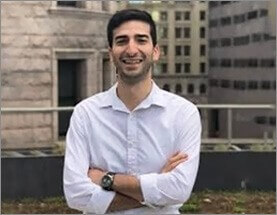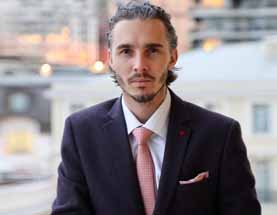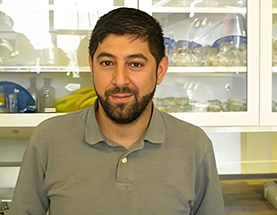
Support Us
Donations will be tax deductible
Ray Dogum joins us today to discuss his podcast, Health Unchained, and his interest in blockchain technology and its applications to healthcare information management. After seeing his family and friends navigate frustrating obstacles in the healthcare system, Ray began dedicating his career to improving the patient healthcare experience. Specifically, Ray is interested in changing how patient information is handled and stored and believes blockchain technology may solve some of the inefficiencies that are frustrating to both healthcare providers as well as patients. In this episode, Ray and Richard discuss the applications of blockchain technology to managing patient healthcare data, what that would look like to everyday patients, and how long we might expect healthcare companies to start adopting this technology.
Ray also discusses his current and previous podcast shows, and how hosting podcasts has helped him gain insight into the players and possibilities of the healthcare industry.
For more information, visit healthunchained.org or visit his profile on LinkedIn at https://www.linkedin.com/in/raydogum.
Richard Jacobs: Hello. This is Richard Jacobs with the Future Tech Podcast and I have Ray Dogum, he’s the head of his own podcast called health Unchained and he focuses on blockchain and how it’s being used in the healthcare field. So very interesting. Ray, thank you for being here.
Ray Dogum: Richard. Thank you for having me on the show. I’ve been a listener for a while, so thank you.
Richard Jacobs: Yeah! I appreciate it. So why healthcare and why blockchain in healthcare? Now, unfortunately, it usually means the person had health problems themselves, but hopefully, that’s not the case with you. What’s your backstory on it?
Ray Dogum: I mean, I would say like everyone has their own personal experiences in the healthcare industry. Just navigating through a hospital visit or dealing with someone who has been diagnosed with a serious illness and just going through that process of collecting information helping them navigate different providers and organizing insurance information and just getting all that paperwork done. I don’t think anyone loves that process. But the way I feel or the way that I’m seeing the industry as it grows is that there’s opportunity for better interoperability, better communication amongst different companies in different industries, like silos of I guess data banks that we have now and that in my view, I don’t think it could be done unless we use some sort of distributed system to not only align the interest in the data, but also the financial interests in the incentives, financial incentives in the health care field.
Richard Jacobs: It’s weird. I mean my house records are priced in 20 different places and then I am in my forties, anyone in their 40s, 50s, 60s they’re never going to get most of their healthcare data. It’s all over the place.
Ray Dogum: It’s hard to get
Richard Jacobs: It makes you wonder first, why isn’t this stuff all in one common database where it’s accessible by the person who’s health day it is.
Ray Dogum: Well, there is a good answer to that, I think. Until recent technology like blockchain we couldn’t really, we needed to protect that data separately because of HIPAA compliance laws. So every organization or provider Health Organization, they wanted to keep their patients’ information held securely and if one patient’s information was, loaded onto a single database that everyone used, a breach into that database could mean, you know, a huge, a loss of patient information that can be leaked into the Internet. So I’m having them in silos kind of prevents someone person from accessing all of a person’s health information at the same time, so they’ll have to go to all of the multiple silos. But again, that makes it really hard for the patient and it makes it really hard for the provider as well because the provider is probably working with limited information about the patient.
That can cause no misdiagnoses or just misinformation to the patient as well. So I’ve started looking at blockchain as a solution and the way I saw it was I knew this technology is going to take many many years for actual adoption to occur. So I realized being in healthcare myself, I work for a company called American Well, it’s a telehealth company. I’m a project manager there where I actually help health systems implement telehealth solutions and just speaking to the folks there, speaking to people in many different conferences and just kind of like networking, I realized healthcare has a huge problem with trust and the promise of Blockchain and distributed ledger technology is to create a trusted relationship with people without having to necessarily trust who they are exactly.
So you can trust that the data that you own will be continuously owned by you and only accessible by you and in a way, if someone wants to access it, you can give them permission to do that, but you would be able to see whether or not they did access it or not. And this is just like a theoretical, like a single workflow that I’m talking about. There are many different implementations of blockchain. Currently, there are interviewed over 40 companies already in the space on my podcast. It started about a year ago,
Richard Jacobs: But you know, it’s the nice thing like Baird’s a Bitcoin, right? Someone would have an incentive to break into your bitcoin wallet and steal your stuff cause it’s fungible. It’s worth a lot of money. It’s very little incentive for 99% of the people in the world for someone to steal your out data. It’s not really worth much, so blockchain has great security, but even so this, I would think there’s very little danger of someone wanting to steal your health records. If you’re a politician, okay or a movie star or a really high net-worth person, but then you can always charge that person more for added layers of security that they need. But the average person who cares if they steal part of my data and they know I had a sinus infection three times in the past four years. How’s that going to help them?That was not here as a brainier solution in the blockchain would be great at it.
Ray Dogum: Yeah! So what we’re talking about now is medical records on the blockchain kind of application and that’s just one of the applications and I agree with you. For most people, it doesn’t matter too much, but you never know a person could become famous in the future and then their previous health records could be used against them for example. And another thing is the data itself has some value too. If you think about what pharmaceutical companies do is they purchase de-identified health data in order to try to identify better drugs to use for specific types of illnesses.
Richard Jacobs: But the nature of blockchain is that data is in little mini faults. If I have my health data and it said a whole bunch of different addresses, I mean, good luck cracking one, much less five, 10, 20 of them. Cause, I mean you could set it up in a way where it would be so unworth it for someone to crack x numbers of addresses to get your health data as to be, I think a great solution and then me as the owner of my own data, I could monetize it pretty easily and kind of flipped the table, flipped the script on where the data now is valuable to me. I can make money from it. Well, I can choose to share it and monetize it.
Ray Dogum: Exactly Exactly.
Richard Jacobs: This seems like a great solution for it.
Ray Dogum: Right! And it’ll continue to be more valuable as the technology improves. For example, genetic information, your genetic data is valuable to you. It can be used in many applications, companies seek that data. It’s valuable to them as well. But right now we don’t really have ownership of it. There are companies trying to create that sort of business model where the person owns their own data and they can monetize it themselves. One company I actually interviewed it was nebula genomics they actually based here in Boston, or at least they were founded here for sure and Harvard and I would say that what they’re doing is pretty interesting and they’re allowing people to do a whole genome sequencing on their, spin to a little vial. They get that sequence and then they can look for certain types of studies that are being done that are in line with their DNA and then they could basically collect some funding for participating in that study. So they might have to answer a few questions or they might have to provide additional samples of whatever. But it allows the person to kind of participate in science really and be compensated for that time and effort as well.
Richard Jacobs: So why is blockchain not being adopted here? What do you see as the stumbling blocks? Is it technology? Is it economic? what are the issues?
Ray Dogum: Yeah, there are multiple issues. One thing is in healthcare at most technology takes a long time to become adopted. As I said, I work for telehealth, a technology provider, American well, and telehealth might seem like a great idea to us right now, having a conversation with your doctor over a video chat versus having to go many miles perhaps just to do a consultation that makes sense to us. Right? But there are still barriers for that to happen. Different states have different laws.
But again, I think the state of telehealth now is pretty good. But again, this has been, TeleHealth has been part of the ecosystem for over 10 years is just now becoming more embraced. So that’s just an example of technology taking time in healthcare and I think for blockchain it’s even more complicated because you’re introducing potentially tokens or things of value like coins.
Richard Jacobs: You don’t have to
Ray Dogum: You don’t have to necessarily right, you don’t have to, but a lot of times they’re, you can use tokens to actually incentivize different behaviors that you’re looking for. So I would say that the companies that are leveraging blockchain without tokens or coins might have better success at least initially for sure. But I think that the incentives that come with tokenization of things and behavior is important in the whole blockchain space overall.
Richard Jacobs: It would make it better sure right. You link it with let’s say insurance and give me an incentive my premium will be reduced $1 a month for each token I earn because I demonstrate that I’m walking 10,000 steps a day, that kind of thing where I’m eating this or not eating that gamification then incentivization is great with tokens but it seems like the first thing is at least give people a choice. Am I more worried about being misdiagnosed and killed, or getting sicker or not getting treated because of my data’s in 84 different places? I can’t get to it. What am I worrying about? A hacker maybe getting it and/or not being able to monetize it myself. Like, I think people should have that choice and they don’t.
Ray Dogum: Yeah, no, that’s a good point. I mean it is still pretty new in the healthcare space. So like for example, there are a few dozen good companies in my opinion that are out there now like actually gaining some market traction and people are partnering with them to do trials and testing. So I think there is a bright future ahead. Organizations like hashed health is really helping to educate people on a lot of these issues and a lot of these types of applications, provider credentialing is another important or maybe even one of the first applications that will become adopted I think and multiple companies are attempting that as well and many of them aren’t even using like tokens that gain value either. It’s just more like a distributed ledger technology without tokens. So yeah, there, there are lots of potentials out there. The reason it’s not being adopted right now is it’s very new. It’s a strange thing and it’s probably the same reason blockchain is not being adopted everywhere immediately or how bitcoin is still gaining traction but not mass use, not everybody is using it.
Richard Jacobs: Right, right. Well what’s being on the inside somewhat and knowing the industry and doing a podcast and now talking to dozens of companies, which I’m sure will grow into the hundreds over time for you now what’s your perception of the industry is that we’re getting there, you know, how many years until he’s got my medical data is on some kind of blockchain and I can see it all and maybe monetize it. I mean what do you think is going to happen and when and what are the steps ?
Ray Dogum: Yeah, I mean I think the steps now are really about education. I think a lot of small companies, these startups are trying to pursue pilot projects, which is great and it’s part of the education process. You’ll have innovators and leaders in innovation are trying to use blockchain in their existing operations but I think that’ll take at least two to three years to actually be a widespread. I don’t think you’ll have your medical records on the blockchain for at least another three to five years. That’s how I’m seeing it. But I could be wrong and I hope I’m wrong, but based on the trends that I’m seeing, it’s, this is going to be a slow process. It’s gonna change the way we look at security privacy and yeah, it’s going to put the owners responsibility back on the patient’s end versus having to rely on the providers for maintaining that secure and private records.
Richard Jacobs: You know, if you want me to talk a little bit about your your podcast. We talked about the subject of it, occasionally people ask me, why do you do a podcast and what do you get out of it? So you want to talk about yours a little bit? Some of those same questions, like what prompted you to start it?
Ray Dogum: Absolutely! Yeah. So I was the reason I started the podcast and the reason I thought it would be a good idea was I was personally very interested in improving healthcare as an industry overall and I did an MBA where my focus was on the healthcare industry and I kept running into the same problem. People were spending a lot of time and effort trying to validate information or data and it was people running in circles and I realized blockchain seems to be a great solution, but no one was really talking about blockchain in healthcare that much. There were a few companies at the time and you know, hashed health was one of the companies that were around. When I thought about the idea they were part of my inspiration and I realized, okay, well I want to learn as much as I can about this and that means I have to talk to a lot of people and maybe instead of just talking to those people and you know, benefiting myself, I can actually benefit the entire community. The whole idea behind blockchain or the ethos is really about community and how multiple parties trusting in the same network. I thought well this is going to be a big thing in the future. So let me start these interviews with CEOs of healthcare and blockchain companies and see what happens and see what kind of traction I get and who’s interested in it. And since I started, I’ve been at a few conferences I’ll be speaking at a conference actually in October as well on the 15th. That’s the CONV2 X Conference in Boston. It has just been great meeting a lot of new people, learning about what they’re working on and yeah, that’s kind of how I got into it really.
Richard Jacobs: Yeah, you probably know this but you know after awhile if you talked to enough people you know, I’m not saying I get to worried about it. I feel like I’ve got like a birds eye view of the industry. I can see all the players, where they’re going, what they’re doing and it just allows you to choose a spot in the industry that you want to be in and just have a better sense of all the possibilities that’s what I’ve found by doing it. I could see what hashed health is doing this ant is building this tunnel and what’s this one doing and that’s the perspective I’ve gotten from doing.
Ray Dogum: Yeah, no, absolutely. I think it’s, it’s been really eye opening how companies talk about blockchain and some companies after my interview I’m like, I don’t think that your business model is sustainable and I might not tell them that right away, but I might be thinking it just based on my previous conversations with people. And again, like I really do hope that everyone I talk to is successful in what they’re doing. But I think that there’s so much complexity in this industry and if they don’t have a healthcare background any experience in implementing new technology in healthcare, it’s very difficult to get into it, so yeah you’re right having that is super useful.
Richard Jacobs: Yeah.! You also hear a lot of again, a lot of different angles and possibilities that you may not have thought of. Oh yeah, that’s true. I didn’t know you could, that’s interesting to do that with healthcare. Maybe I can incorporate that into what I’m doing where you hear someone that’s just a really great explainer of a thing, a real good simplifier so it makes total sense and okay that’s a good way, ‘ll explain it that way from now on. That’s some of the other benefits that I’ve gotten from I’m doing it and I made a lot of friends and contacts and then you get the, everyone knows you if you’re friendly and people like you and then it makes it easier to be in an industry anyway as well.
Ray Dogum: That’s totally true. And like me, my personality, I do love meeting New People, talking to them and networking at different events and just like, you know, making friends with people. And I think that is part of the reason I did this. I love talking and especially about this topic. It’s very fascinating to me and I truly do think it’s gonna change the way we not only view healthcare as an industry, but the way we view our health or the way we experience in life really that’s how I see it, and one thing to also note, I did have a previous podcast before I started health. Un chained which I started with a few classmates of mine at Boston University during my MBA and that one is called a positive feedback loop. It’s not about blockchain or healthcare, it’s kind of open-ended we just talk about almost kind of like random subjects but we are very different in our approaches or how we think about the world really. So it creates kind of like conflicts and clashes in our conversations. So I think it is a stimulating podcast as well. So I encourage your listeners to check that out if they’re interested. And it’s not technical at all. So it’s pretty fun. It’s called a positive feedback loop.
Richard Jacobs: Okay! What’s your goal now over the next year or a couple of years? What do you hope to happen with the podcast and with blockchain and healthcare itself?
Ray Dogum: Yeah, I mean, the goal for me right now is really to just keep generating more content and hopefully make a reputation for myself where I can be a trusted source for kind of information on the industry and you know, grow in that way. I would like to build a community around my podcast. So having all of these guests that have been on the show there, many of them are also in my telegram community. So we have conversations online and anyone is welcome to join that. It is public as well. So I just continue to try to grow that and hopefully, people will realize like the true impact this can have on the world. So yeah, I’m just very encouraged by all of that. And I encourage people, you know, get out there and try to learn a little bit about it. I think it’s like it’s going to affect you one way or the other. Everyone is affected by healthcare in one way or another.
Richard Jacobs: Yeah, that’s true, unfortunately, and for us to affect in a good way and then in the end, more effective in an ultimate way. What are some resources for listens they can listen to your old podcast, your new podcasts? I mean, what are a few resources for people to follow up with you?
Ray Dogum: Yeah, I mean, I’m on Linkedin for sure. Just search Ray Dogum on LinkedIn and I’m also, I have a website Health Unchained.org. You can check out, just feel free to reach out to me through LinkedIn’s probably the best way.
Richard Jacobs: Okay thanks for coming, I really appreciate it.
Ray Dogum: Thank you so much, I appreciate it, Richard.
Podcast: Play in new window | Download | Embed

Join us in this episode as we explore the world of complex problem-solving across industries with Hunter S. Gaylor, an executive partner, financial expert, and author. Hunter is… Read More

In today’s episode, Dr. Shawn Javid and his son, Dr. Ben Javid, join the podcast to discuss how they’re revolutionizing oral healthcare as co-founders of Smilebody. Created by… Read More

Can science turn any blood into a universal donor type? Join us in this episode as we explore groundbreaking healthcare innovations with Maher Abou Hachem, a distinguished Professor… Read More

In this episode, we sit down with Brandon Beachum, a serial entrepreneur, thought leader, and co-founder of ResortShare. After achieving tremendous success in his business ventures, Brandon shifted… Read More

How does maintaining hormonal balance affect your overall health, and what changes occur when it’s optimized? What strategies can you employ to tackle persistent weight issues that seem… Read More







Subscribe to Our Newsletter
Get The Latest Finding Genius Podcast News Delivered To Your Inbox